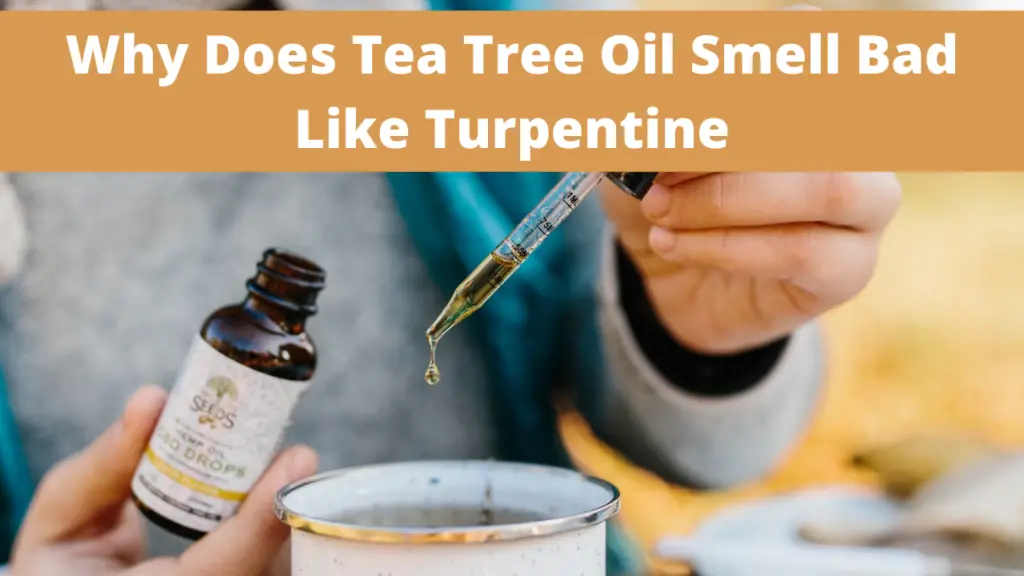Tea tree is known for its fresh, slightly sweet scent. The oil is ideal for using in hair and skincare products, and many people favour it purely for its pleasant odour alone.
But if you’ve bought your fair share of tea tree oil over the years, you may have realized that not all tea tree oils smell the same. While some have that appealing sweet scent, others smell bad – almost like turpentine.
Tea tree oil and turpentine share many compounds and ingredients such as cineole and terpinen. However they have completely different uses and should not be used in the same way, even though traditionally they were used to treat similar ailments. Both are toxic if ingested and are harmful to animals.
If you’re not familiar with turpentine, it’s the strong, sharp-smelling stuff that’s mixed in paint, varnishes and liniment. It’s safe to say that the smell of turpentine won’t exactly have you hurrying to apply the oil to your skin. So why do some tea tree oils smell that way? Is it a bad sign?
Essentially, the smell comes down to the quality of the product.
Tea tree oil is usually derived from the melaleuca alternifolia tree, but this isn’t always the case. It’s common for cheaper tea tree oils ones to be derived from other varieties, and these may have a different quantity of terpinenes. Different oils are also extracted in different ways, which could result in a change in smell.
Additionally, cheaper oils may be diluted to cut costs, and the methods used to do this could emphasize the unpleasant turpentine smell. Finally, with tea tree oil being derived from a plant, each batch of oil will likely have its own unique qualities, depending on the location of the plant, the time of harvesting, the quality of the plant itself, and so on.
In short, if you buy tea tree oil that smells like turpentine, it’s probably an indication of the oil’s quality – and nothing to worry about.
But a bad smell may also be linked to something else: rancid oil.
If you’ve taken a bottle of forgotten-about tea tree oil out of your cupboard, don’t assume it’s still fine to use. Like all oils, tea tree has an expiry date. If your oil has expired, it may take on a stronger smell that borders on unpleasant. In fact, tests have found that when tea tree oil is left for several decades beyond its expiry date, it takes on a solid form and smells so strongly of varnish or gasoline that it’s pretty unbearable.
It’s likely that your tea tree oil has expired if it has been sitting in your cupboard for years. Check out the expiry date, and don’t use the oil if it has passed that date.
If your tea tree oil hasn’t passed the expiry date, it may still have expired for one of the following reasons:
1. Oxidization
When tea tree oil is exposed to oxygen (or air), it undergoes a chemical change that is known as oxidization. As soon as you open the seal on your tea tree oil, a small amount of oxygen will be able to get in. This can cause the oil to deteriorate more rapidly, and the oil will quickly start smelling nastier and more pungent. The oil may even take on a sticky consistency if left for too long.
2. Heat and Light
Heat and light can also shorten the life of your tea tree oil. If you store your oil in a location that exposes it to sunlight – even if it’s in a spot that sunlight can hit from across the room – it’s more at risk of losing its beneficial properties. Hot locations can also cause the oil to go rancid, and even humidity can have an effect on the oil. Don’t store it in your bathroom if showering makes the room very humid.
The best way to store tea tree oil is in a dark, tinted glass bottle or a stainless-steel container. This will prevent sunlight or air from getting into the bottle. Plastic bottles should also be avoided, as they can react with the oil over time.
If your oil definitely isn’t rancid but smells like turpentine, it’s still fine to use.
Whether or not you can put up with the smell depends on your own preferences and sensitivities. Diluting the oil with a carrier oil should help to reduce the smell somewhat – and it goes without saying that you should never apply undiluted tea tree oil to your skin or hair, anyway.
If you really don’t like the smell of the oil, either recycle the bottle safely or see if you can find a friend to give the product away to. You can then purchase a more expensive product, which is likely to be a higher quality, or choose another essential oil with similar benefits that you prefer the smell of. Remember, tea tree oil can be toxic to the environment, so think twice before you toss it out or pour it down the sink.
